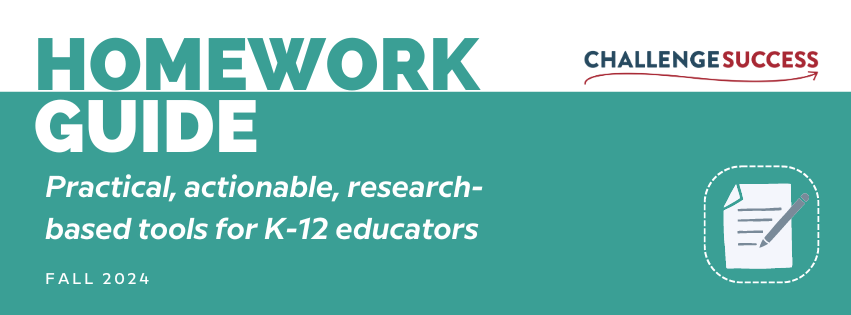
What will homework policies look like that are evidence-based, factor in student well-being, and promote meaningful learning?
California is about to lead the way in finding out! California Healthy Homework Act (AB2999) was recently signed into law, encouraging school districts and local education agencies to create homework policies that:
- Use research to align policies with the developmental needs of students in various grade levels
- Emphasize meaningful assignments over “busywork”
- Prioritize students’ mental and physical health
- Consider equity and access implications
Looking for help creating evidence-based homework policies in your school or district? Download our free Homework Guide or reach out to our team for more support.
Challenge Success Student Voice Survey Data Informed the California Healthy Homework Act
Dr. Denise Pope, co-founder of Challenge Success and senior lecturer at the Stanford University Graduate School of Education, provided testimony and data in support of the California Healthy Homework Act to the California State Assembly earlier this year.
“We are concerned about the inherent inequities presented by homework,” said Dr. Pope. “We know that not all kids have adequate support, technology, accommodations, or resources in their homes to complete the homework they are assigned. Lack of clear homework policies may unintentionally harm students who are already marginalized due to housing, identity, or socio-economic status.”
According to the bill’s language, homework policies should have the input of teachers, parents, school counselors, social workers, and students. School districts would be encouraged to distribute their policies at the beginning of every school year, and those policies would need to be reevaluated every five years. To read the full text of AB2999, visit https://legiscan.com/CA/bill/AB2999/2023.
“We believe it is important to bring student voices into conversations about policies that affect their well-being,” said Dr. Pope during her testimony. “For example, 45% of students reported overall workload and homework as a major source of stress. This was selected over several other stressors, including future plans, college, and relationships.”
In her testimony, Dr. Pope cited a Challenge Success survey of about 15,000 California high school students, of which 52% indicated feeling that most assignments were little more than busywork. About 57% reported that their homework prevented them from getting enough sleep. In 2020, a report by Challenge Success highlighted research that showed that spending more time on homework does not necessarily correlate with student achievement, particularly in the younger grades. The report also found that students with higher homework loads were more likely than their peers to experience symptoms of exhaustion and low levels of sleep.
According to the Challenge Success 2024 Student Voice Report, which analyzed data from more than 270,000 high school students across the country, insufficient sleep is a common issue that contributes to excessive stress. Students who do report getting enough sleep report lower stress levels than those who do not. In general, children and teens require more sleep than adults. According to the CDC, 8-10 hours of sleep are recommended for high school students, while younger children should get 9-12 hours.
The Healthy Homework Act encourages homework policies that prioritize students’ mental and physical health, align with the developmental needs of various grade levels, and allow for student, parent, and educator input. Schools and districts will also be encouraged to consider the equity of resources and technology available to students, while seeking to prioritize meaningful assignments over large volumes of homework.
We applaud the State of California for continuing to consider student well-being in its policymaking. Considering student well-being, equity, and best practices for learning is absolutely essential in order to help all students thrive.